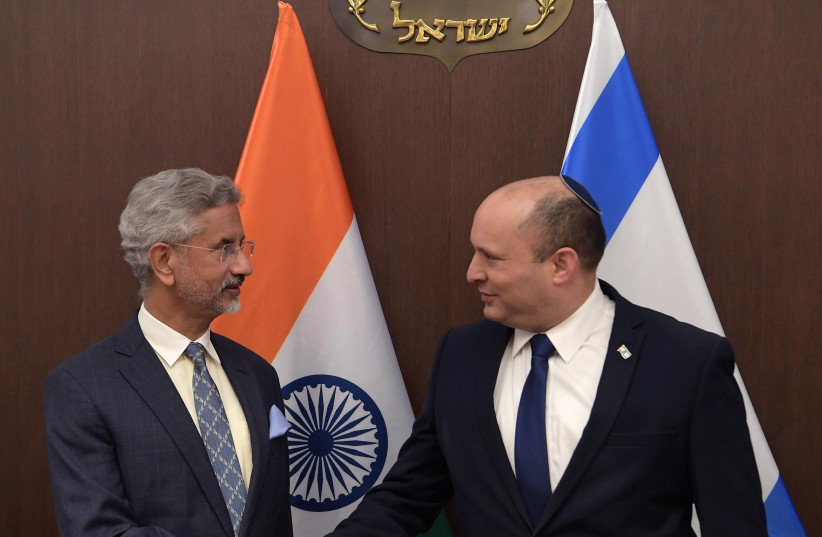In recent months we have witnessed visits by high-ranking Indian officials to Israel. It began with the visit of Indian Air Force chief marshal RKS Bhadauria in August, and last month the important visit of Indian Foreign Minister Dr. Subrahmanyam Jaishankar came with a clear goal of voicing the commitment that India and Israel have to the continuation of bilateral ties between the countries.
In addition, Dr. Jaishankar invited Prime Minister Naftali Bennett to pay an official visit to India and meet with the prime minister of India. Furthermore, India’s chief minister came to Israel to strengthen security cooperation between the countries. All this is happening in a broader context of the rapprochement of Indian interests in the Middle East which directly affects India-Israel relations. Later this year the two countries will mark the 30th anniversary of the normalization of their relations and it seems they will not miss an opportunity to mark the momentous occasion.
India’s foreign policy since the election of Narendra Modi as prime minister in 2014 has been characterized mainly by a willingness to engage with key players who can be useful in promoting India’s position in the Asian region, in particular, and in the international arena in general. The refreshing change in policy also directly affects India-Israel relations. Modi has expressed a desire to tighten ties between India and Israel unlike his predecessors, who walked between the drops and tried to do as much as possible to avoid antagonizing the Arab world.
For years, the conventional wisdom in Indian foreign policy has been that it is necessary to strengthen relations with Arab countries and try to gain their support in the Indian-Pakistani conflict. But in fact, India never received the support of Arab states, and it was Israel that helped in the India-Pakistan crises of the 1960s and 1970s. It wasn’t until the early 1990s, after the end of the Cold War and the loss of its key ally, the Soviet Union, that India rethought its foreign policy and, as a direct result, India’s relations with the West, especially the United States and Israel, tightened.
While the Palestinian issue has been the main obstacle in India-Israel relations in the past two decades, the Palestinian issue has been pushed down the agenda of the Arab world, allowing India to maneuver more and invest in its relations with Israel. The rise of radical Islam in the Middle East in the form of ISIS and the events of the Arab Spring have further widened the political space in the region and India is maneuvering among the various players in the regional system.

Since then, India’s foreign policy toward the region has been based on neutrality and anti-colonialism. Modi’s rise in 2014 appears to have brought an end to the nation’s non-aligned ideology in favor of pursuing a policy of plurality with different players on the international stage, while still stressing the importance of the West Asia region.
In recent years, India has become a major economic power due to economic prosperity and development. With Modi’s rise came a drift of nationalism in a country that brought India closer to its diaspora around the world and especially in the Persian Gulf states.
On September 15, 2020, an agreement to normalize relations between the US, the United Arab Emirates, Bahrain and Israel was signed at the White House, with Morocco and Sudan later joining in on the normalization with Israel deals. Following the agreement, the International Federation of Indo-Israeli Chambers of Commerce was established in the United Arab Emirates. The federation’s primary mission is fostering innovation, trade and investment. The normalization agreements signed, along with the excellent relations India has with the UAE and Israel, are fertile ground for strengthening India’s position in such a volatile region. From a seller-client perspective, there are collaborations on issues as diverse as the military and the economy. The UAE has a large Indian diaspora (Indians make up 30% of the population).
This is an important statistic that underscores the importance of the relationship between the countries. Today, trade between India and Israel is very low compared to trade between India and the UAE which stands at $5.59 billion. India has said that the goal is to boost trade between the countries to $115b. in five years. Israel also understands the potential for trade between the two countries and wants to show off its wares. The goal is to strengthen cooperation in various fields such as cyber, chemicals, medical equipment and more.
An important step forward is forming agreements that include multiple countries, such as the strategic step of establishing the Western QUAD with the participation of the US, India, UAE and Israel to advance various issues that support the interests of the countries in the region. An example of these agreements was shown during the Indian foreign minister’s visit to Israel last month, as there was a first-ever trilateral agreement signed involving the production of a robotic solar cleaner in India for a project in the UAE by an Israeli company.
There is no doubt that India’s position in the region and its importance for Israel will increase as cooperation continues to be stable and deep.
The writer is a member of Forum Dvorah: Women in Foreign Policy and National Security and a Phd candidate in Political Science at Bar-Ilan University.
